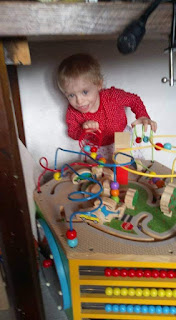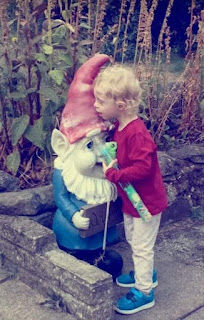Keep age out of it
Within the golden years of early years education you'll have so much more fun and have a far more fruitful and successful outcome if you place age far away from your mind.
Age is irrelevant to a degree at this stage.
A three year old can be more proficient in transferable skills than a six year old.
Now doesn't that sound negative?
It wasn't meant to be. It is a simple fact, however it holds an extremely negative vibe.
Straight away you're thinking, how clever is the three year old and wondering what's wrong with the six year old.
This is so damaging and unfair.
In this theoretical scenario, the three year old was engaged, showing cues that they were ready to begin learning through play. They began the learning journey step by step, gently at their pace, through fun and play, resulting in being able to read and write.
The six year old in this case may have missed out in some of the steps in the early years journey. There may be a developmental delay in motor skills. There may be a learning difficulty or they may be neuro diverse and just need extra time. They may have not being given access to an environment which facilitates this learning.
In mainstream school they'll be expected to complete the level of a six year old which will be beyond them.
You cannot expect the six old to pick up a book and read, or a pencil and write beautifully if they have missed the vital steps of each skill. They should return to the level where they actually are, not where they're meant to be with age. They may be at the stage of a 'three' year old and should ideally be learning at this level.
The three year old may be ready for school.
Now this made me sad and feel slightly sick when I wrote this theoretical scenario, using this language. It is so negative and would shame the six year old.
Remove the age pressure out of the equation and this entire situation changes.
They are at the level which is right for them. Number the steps of the writing process and reading process, and just work through the steps through play, music, movement and fun.
Playdoh is the first step for eventually writing without pain.
Learning the alphabet outside of the song, out of context is a vital step of being able to read.
An achievable and unique goal should be ascertained for every child, this goal will vary. The steps and the timing of these steps should alter for everyone. This is an ideal in order to keep good, stable mental health and happiness for every child. They will stay engaged, eager to learn, to explore, to progress.
Progression is progression, and looks different for everyone. Slow and steady.
This holds true for every skill, not just in the academic sense. I know two year olds who are further advanced than Xander in what I call personal skills, ie potty training. However, the two year old will not have dealt with severe developmental delays, hospital trauma, chemo and radiation, stomach tubes and medicines which required a ridiculous amount of fluid intake, meaning that potty training was impossible at the 'correct' time. If you see a 4.5 year old in pull ups, you may judge unfairly if you're looking purely at their age. He'll get there.
It's very hard not to compare and judge, but it can be very negative, shaming and affect mental health for the parents and the children.



Comments
Post a Comment